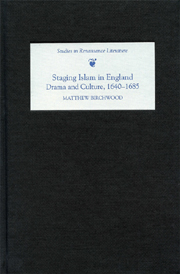Book contents
- Frontmatter
- Contents
- List of illustrations
- Acknowledgements
- Introduction
- 1 Cultural Encounters between England and Islam in the Seventeenth Century: A Topography
- 2 Framing ‘an English Alchoran’: The Famous Tragedie of Charles I and the first English translation of the Qur'an
- 3 Orienting the Monarch: Tyranny and Tragedy in Robert Baron's Mirza and John Denham's The Sophy
- 4 Turning to the Turk: Collaboration and Conversion in William Davenant's The Siege of Rhodes
- 5 Toleration, Trade and English Mahometanism in the Aftermath of Restoration
- 6 Plotting the Succession: Exclusion, Oates and the News from Vienna
- Conclusion: ‘If we our selves, would from our selves exam'ne us’
- Bibliography
- Index
- Studies in Renaissance Literature
6 - Plotting the Succession: Exclusion, Oates and the News from Vienna
Published online by Cambridge University Press: 12 September 2012
- Frontmatter
- Contents
- List of illustrations
- Acknowledgements
- Introduction
- 1 Cultural Encounters between England and Islam in the Seventeenth Century: A Topography
- 2 Framing ‘an English Alchoran’: The Famous Tragedie of Charles I and the first English translation of the Qur'an
- 3 Orienting the Monarch: Tyranny and Tragedy in Robert Baron's Mirza and John Denham's The Sophy
- 4 Turning to the Turk: Collaboration and Conversion in William Davenant's The Siege of Rhodes
- 5 Toleration, Trade and English Mahometanism in the Aftermath of Restoration
- 6 Plotting the Succession: Exclusion, Oates and the News from Vienna
- Conclusion: ‘If we our selves, would from our selves exam'ne us’
- Bibliography
- Index
- Studies in Renaissance Literature
Summary
FOR THE YEAR 1670, the Calendar of State Papers reports the circulation of a pamphlet, instigating,
‘all gentlemen, apprentices, and journeymen inhabitants of London and the suburbs, acquainting them that we are impoverished by foreign nations, especially by the French trading with England, and that we are also in fear of our lives’, and calling upon them to procure arms, and meet in Moorfields between 8 and 9 p.m. of May-day, it being resolved to suffer it no longer; ending, ‘So God save the King and all the royal family. Procure what arms you can, for we are resolved to do it’.
This May Day protest was apparently frustrated and the would-be rioters were brought before the Lord Mayor, Sir Samuel Starling. The ringleader, it transpired, was one Robert Plowman, a tailor who had been a soldier ‘in Col. Read's regiment under Lord Monk, when he came out of Scotland’. Upon examination, he explained that,
The contemplated rising arose from the number of French in London, and the talk about the joining together of the French and Turks, and their intention of coming to make war with England, which he related to his fellow workmen, who becoming excited, agreed to issue an address, which he wrote, to their fellow apprentices, to meet together, and to set up a copy of it at Whitehall.
Another examinant testified that Plowman had become incensed ‘on being informed of the news that the French and Turks had taken English ships’.
- Type
- Chapter
- Information
- Staging Islam in EnglandDrama and Culture, 1640–1685, pp. 156 - 181Publisher: Boydell & BrewerPrint publication year: 2007



